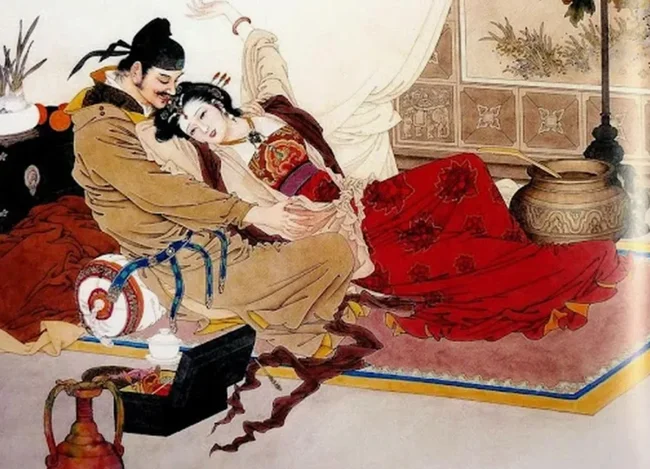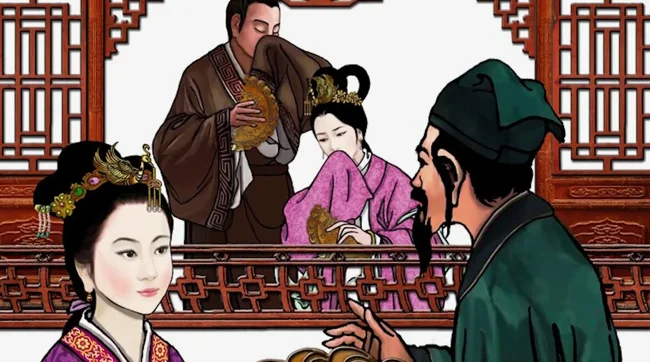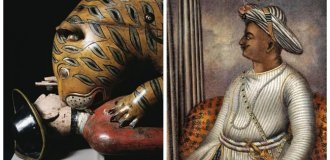Why in China a widow would rather cut off her nose than remarry (7 photos)
And it's true that women cut off their noses! Just to avoid accepting a proposal from another man after the death of their husband. And not only their noses, they maimed themselves just for the journey. At the same time, in ancient books, this was done by women who were proposed to by worthy men - imperial officials. 
A woman defends herself from "marriage" with both hands
What kind of widow trend is this?
The ruler of Wei in the 4th century BC even awarded a beautiful widow the title of "Immaculate" for refusing his official in marriage and cutting off her nose so that he would not insist any longer.
And all because a woman was considered pious if she remained chaste forever after the death of her husband. And not every woman could afford such an honor, only a rich one. The poor had to seek protection and food from another man. 
Fall into the arms of another man if your husband is dead? What immorality!
It's just that in every dynasty there was a ruler who declared that remarriage was a betrayal of the husband. But he did not issue any decrees with prohibitions, so that poor women would not die of hunger, he was smart enough for that.
However, with each generation of rulers, widow chastity was increasingly promoted as correct. For long-term abstinence from marriage, "chaste widows" were given grain and expensive pieces of fabric.
When did this grow into an official ban
And after a thousand years, already in our era, public opinion finally forced the emperor to adopt an official ban. But again - not for the poor. 
In Asia, there is nothing more terrible for a girl than to get a scar. Yes, they are not Vikings
In the Sui Dynasty in the 600s, widows of government officials of the ninth rank and above were forbidden to remarry.
The famous poet Bai Juyi even wrote a poem called "The Misfortune of Women", in which he wrote about the injustice of the ban on widows from remarrying.
"They say that a husband and wife should be as close as one. But when it comes to life and death, their misfortune is never divided fairly. If the husband dies, the woman must spend the rest of her life with only the children. But if the wife dies, the man, although he feels grief, can quickly marry again, just as a willow can sprout again after its branches have been broken."
As the saying goes - so where is he wrong? 
"And it's also good to meet people in the cemetery" - this is not about ancient China
However, despite the unfairness of this attitude, the pressure on widows only increased over the years. In the Song Dynasty, 300 years later, it was already written that it was shameful for a man to marry a widow. Because "if someone marries a woman who has lost her honor, he will lose his own."
The problem of hunger and poverty was no longer a limiting factor for condemnation. Now philosophers believed that it was much better to die of hunger than to lose their chastity. Do you see how philosophy and officials were getting separated from the people?
It was then that remarriage began to be considered shameful. 
In honor of the most pious women, such arches were erected, but... they wrote the name of the deceased husband on them!
The laws also stipulated that if a widow remarried, she could not inherit the property of her first husband.
In the Yuan Dynasty, another hundred years later, the law even forbade a widow to take her dowry with her if she remarried. That is, all her personal property belonged to the family of her first husband.
Another hundred years later, in the Ming Dynasty, the government was already issuing "certificates of merit" to chaste widows. Those who never remarried in their entire lives, those who took their own lives to resist violence, and those who committed suicide after the death of their husband. 
- Will you marry me? - Why are you offering me all this indecent stuff!?
Zhu Yuanzhang, the first emperor of the Ming Dynasty, decreed that if a widow lost her husband before age 30 and did not remarry after age 50, her family would be exempt from taxes. Logically, families put a lot of pressure on young women and effectively prevented them from seeing men, lest they rush out and marry.
The number of widows is growing exponentially
With the propaganda of such a strange culture, it is logical that the number of chaste widows increased dramatically during this thousand years. And many women did it voluntarily, because they wanted approval and glory, not shame. If the groom was persistent, they could really kill themselves or disfigure themselves so that he would leave them alone. Who needs this female happiness? It's shameful! 
But this is not India, when widows could be burned with their husbands.
According to research, before the Song Dynasty, there were only 92 women who received awards for chastity. However, in the Ming Dynasty alone, there were more than 27,000 (imagine that!). Well, no one thought about demography back then.
And during the Qing Dynasty, more than 1 million widows were recognized by the government for their chastity.






























